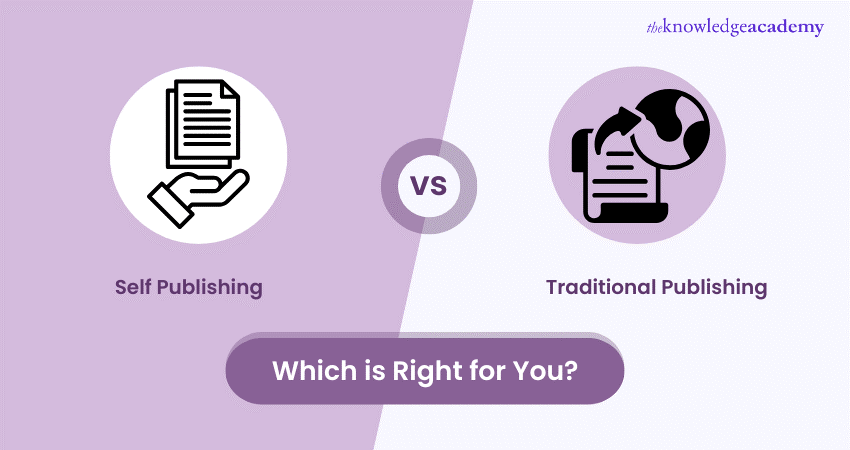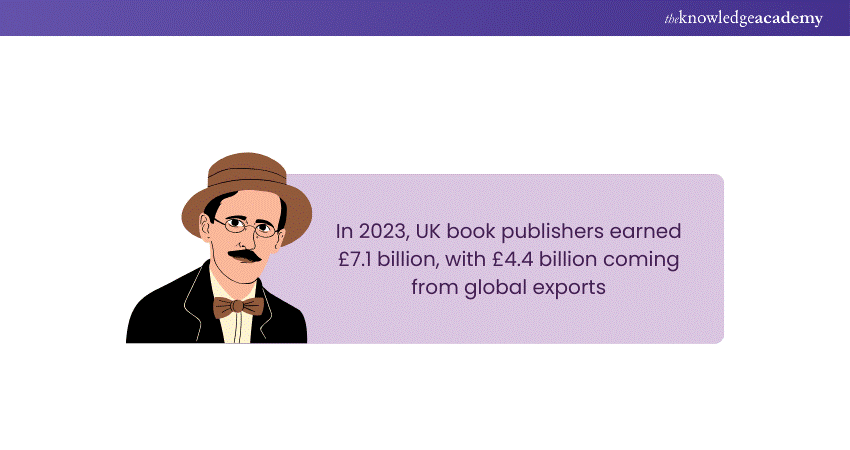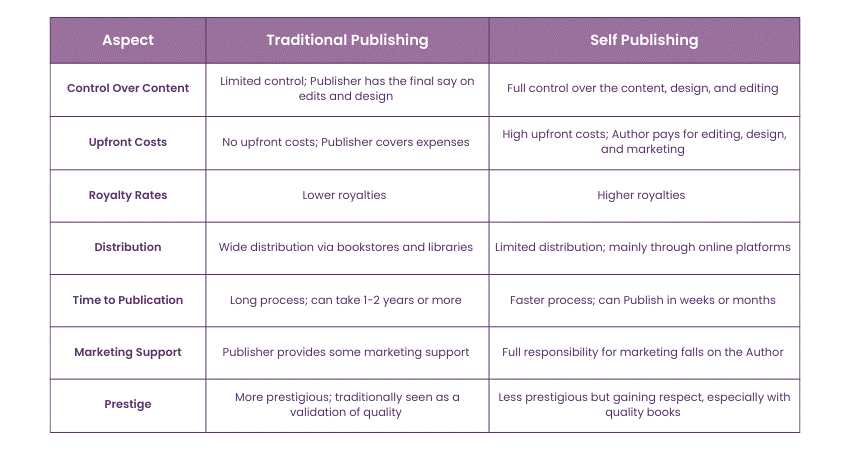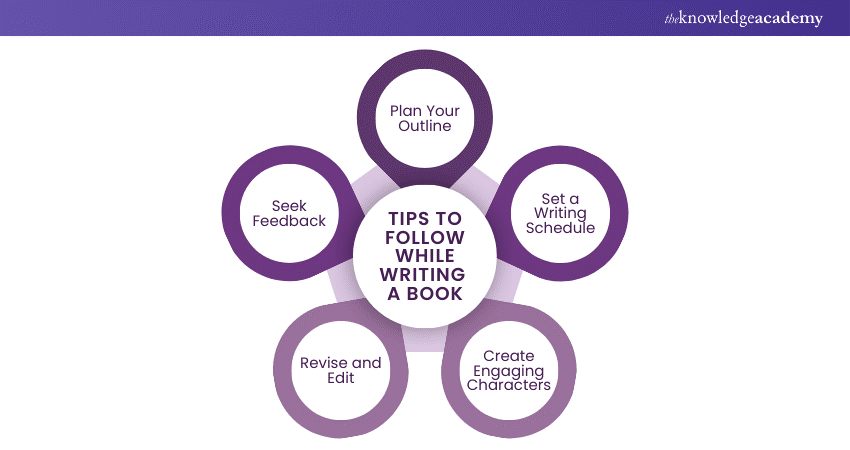We may not have the course you’re looking for. If you enquire or give us a call on 01344203999 and speak to our training experts, we may still be able to help with your training requirements.
Training Outcomes Within Your Budget!
We ensure quality, budget-alignment, and timely delivery by our expert instructors.

Imagine you’ve poured your heart and soul into writing your first novel. Now, you’re at a crossroads: should you self-Publish or seek a traditional Publisher? This decision can shape your writing career, so it’s crucial to understand the differences between these two paths. Have you ever wondered how much creative control you’d have with each option? Or how the financial rewards stack up?
In our blog, “Self-Publishing vs Traditional Publishing”, we’ll explore these questions and more. By the end, you’ll have a clearer picture of the pros and cons of each route, helping you choose the one that aligns with your goals and aspirations. Let’s dive in and discover which Publishing method best suits your literary dreams!
Table of Contents
1) What is Self Publishing?
2) What is Traditional Publishing?
3) Comparing Traditional and Self Publishing
4) Top Reasons to Choose Self Publishing
5) Top Reasons to Choose Traditional Publishing
6) Conclusion
What is Self Publishing?
Self Publishing operates similarly to traditional Publishing, with a few notable differences, which include the Author is responsible for assembling and marketing the book themselves (or outsourcing these tasks), and Self Publishing lacks traditional distribution or sales teams, making it unlikely for a self-Published book to appear in bookstores.
Self Publishing involves six key tasks, which the Author must either manage themselves or collaborate with freelancers to complete:
a) Editing (developmental editing and copyediting)
b) Writing cover copy and marketing materials
c) Cover design
d) Setting your price point and choosing marketplaces
e) Marketing and promotion
What is Traditional Publishing?
Traditional Publishing is the classic method that dominated the industry before the advent of Amazon. Here’s how it works: an Author with a completed manuscript (for fiction) or a book proposal and sample pages (for non-fiction) seeks a literary agent (for major Publishers) or approaches Publishers directly (for small presses).
If there is interest, a Publisher makes an offer, and a deal and contracts are negotiated. An editor at the Publishing house assists the Author in refining the book, and the Publisher begins the production process (cover design, interior design, etc.).

The Publisher’s Public Relations (PR), marketing, and sales teams work to generate interest in the book, aiming for large orders from “accounts” (primarily bookstores). This pre-publication process can often take a year or more. On publication day, the Publisher’s distribution ensures the book appears in bookstores and is promptly restocked. Meanwhile, the Author starts working on their next book.
Comparing Traditional and Self Publishing
Here’s a table comparing traditional and Self Publishing based on key aspects:

1) Creative Control
In traditional Publishing, Authors often have constrained creative manage, as Publishers make key selections regarding the book’s content, cover design, and advertising approach.
In comparison, Self Publishing offers Authors complete innovative freedom, allowing them to make all decisions and make certain the final product aligns with their vision.
2) Entry Barriers
Traditional Publishing has excessive entry obstacles, together with the want to steady a literary agent and navigate a competitive submission method. Many manuscripts are rejected before finding a Publisher.
Self Publishing, then again, has lower entry boundaries, enabling Authors to put up their work with no approval need from a Publishing residence.
Acquire the skills to succeed in every aspect of your life - join our Personal Development Courses now!
3) Distribution Channels
Traditional Publishers have established distribution channels, making sure books are available in famous bookstores, online stores, and libraries. They additionally have connections with media outlets for broader merchandising.
Self Published Authors have to construct their distribution networks, regularly counting online platforms like Amazon and social media to attain readers.
4) Publication Timeline
The publication timeline in conventional Publishing may be lengthy, frequently taking up a 12 months from manuscript attractiveness to book launch due to the tremendous modifying, design, and advertising procedures.
Self Publishing gives a far faster timeline, as Authors can manage the pace of manufacturing and releasing their books as quickly as they are ready.
Top Reasons to Choose Self Publishing
Self Publishing offers a unique opportunity to maintain creative freedom, reach a global audience, and maximise profits. Here are the top reasons to consider Self Publishing:
1) Higher Royalty Retention
Self Publishing allows Authors to keep a much larger share of royalties compared to traditional Publishing. Without the need to split profits with a Publishing house, Authors can retain a greater portion of the earnings from each sale. This financial benefit is especially attractive for Authors with a strong marketing strategy and a loyal readership.
Furthermore, the higher royalty retention enables Authors to reinvest in their work, whether through enhanced marketing efforts, hiring professional editors, or funding future projects. This financial independence can be transformative for Authors aiming to build a sustainable writing career.
2) Full Creative Authority
Opting for the traditional Publishing route means considering the opinions of numerous professionals from various departments. You often won’t have much say over aspects involving market research and technical expertise, such as designing the book cover or creating marketing materials.
In contrast, Self Publishing allows you to be involved in every aspect of the book’s production. While you should collaborate with expert editors and designers who comprehend your genre and target market, they will work towards realising your vision. Ultimately, you have the final say over everything, ranging from the book’s contents and blurb to its cover.
3) Faster Time to Market
A significant advantage of a book deal is having numerous professional editors, designers, and marketers working on your book, ensuring it becomes a top-notch title. However, this collaboration can be frustrating and time-consuming, with numerous emails exchanged between you, your agent, and the in-house professionals. But, if you choose to self-Publish, the timeline depends solely on how quickly you and the professionals you hire can complete the editing, design, and marketing tasks.
Another crucial aspect of Self Publishing is retaining the Authority to Publish your book in all formats. When a Publishing house acquires a manuscript, it essentially buys the rights to Publish it. These may include the following:
a) Primary publication rights (being the first to Publish books in the market)
b) Subsidiary rights (to Publish the book in other formats, such as audiobooks or films)
c) Foreign rights
4) Retain Future Publishing Rights
While most major Publishers with significant bargaining power will seek at least some subsidiary rights, good literary agents will advise you to relinquish as few of such rights as possible. You can sell those rights to other, more suitable Publishers and studios if you wish to Publish in different formats and markets. If you self-Publish, you won’t need to worry about signing away any of these rights.
Top Reasons to Choose Traditional Publishing
Traditional Publishing remains a prestigious and appealing route for many Authors. Additionally, being Published by a reputable Publishing house can lend credibility and open doors to various promotional opportunities. Here are the top reasons to consider traditional Publishing:
1) Focus Solely on Writing
Self-Published Authors are not simply writers; additionally they take on the jobs of marketer, designer, and manufacturing memeber. While having total innovative manipulate is a massive benefit of Self Publishing, it also has its drawbacks. Primarily, being accountable for the whole matter, you should divide sometime between writing your story and managing the publication method.

The primary role of a traditional Publisher is to take your book and package it in a way that appeals to readers. They take care of all of the details related to indoors layout and editing, allowing you to focus completely on crafting the high-quality story feasible.
Learn how to inspire, motivate and lead with confidence - sign up for our Supervisor Training.
2) No Upfront Production Costs
The book market is vast and competitive, meaning that to make the appropriate decisions regarding content, design, and marketing strategies, you need an experienced team working with you. These professionals will expect fair compensation for their experience, and as an indie Author, you will need to cover these costs.
In contrast, traditionally Published Authors do not bear the production costs. The Publisher assumes the financial responsibility for editing, designing, producing, and marketing the book. Additionally, they provide an advance on royalties, which often reflects their expectations for the book’s sales. This advance depends on factors such as the Publisher’s size, the genre's competitiveness, and your existing Author platform.
3) Access to Prestigious Awards
This is one area where it’s virtually impossible to compete as a Self Publishing Author. Unfortunately, prestigious literary prizes and respected lists often exclude independently Published works. While winning an award is always a great recognition, it might not be crucial for your historical romance to be a Pulitzer Prize winner. There are many esteemed indie prizes, such as the Eric Hoffer Book Award, the Writer’s Digest Self-Published Book Award, and the Independent Publisher Book Awards.
Additionally, you won’t be excluded from Amazon’s Best Seller list, which arguably has more influence over readers than the New York Times Best Seller list.
4) Increased Mainstream Visibility
This benefit comes with a caveat — its effectiveness depends on your target audience and whether they belong to the mainstream. If your book aligns with current trends, traditional Publishing can provide a significant boost due to the Publisher’s broader reach and connections. Publishers have the budget and relationships with bookstores, online reviewers, and media outlets to get their books in front of more people than they typically could on their own.
However, if you’re writing in niche sub-genres, targeted marketing to a loyal readership can be just as effective. Publishers typically reserve major marketing efforts for lead titles, so your book’s market appeal and alignment with trends are crucial factors. In many cases, building a dedicated following within your specific genre can yield substantial success, even without the extensive reach of a traditional Publisher.
Conclusion
In summary, the choice between Self Publishing and traditional Publishing hinges on your personal goals and resources. Whether you crave creative control and higher royalties or prefer the established support of a traditional Publisher, understanding the pros and cons of “Self Publishing vs Traditional Publishing” will guide you to the best decision for your literary journey. So, choose wisely, and happy Publishing!
Improve your well-being with our Stress Management Course - sign up now!
Frequently Asked Questions

Self Publishing offers control but comes with pitfalls like high upfront costs, the challenge of self-marketing, and limited distribution compared to traditional Publishing.

Selling to a Publisher provides broader reach, professional editing, and marketing support, but you lose creative control and earn lower royalties. Choosing between the two depends on your goals: Self Publishing suits those seeking autonomy, while traditional Publishing benefits those looking for wider exposure and industry backing.

The Knowledge Academy takes global learning to new heights, offering over 30,000 online courses across 490+ locations in 220 countries. This expansive reach ensures accessibility and convenience for learners worldwide.
Alongside our diverse Online Course Catalogue, encompassing 19 major categories, we go the extra mile by providing a plethora of free educational Online Resources like News updates, Blogs, videos, webinars, and interview questions. Tailoring learning experiences further, professionals can maximise value with customisable Course Bundles of TKA.

The Knowledge Academy’s Knowledge Pass, a prepaid voucher, adds another layer of flexibility, allowing course bookings over a 12-month period. Join us on a journey where education knows no bounds

The Knowledge Academy offers various Personal Development Courses, including the Time Management Training, Supervisor Training, and Self Publishing Course. These courses cater to different skill levels, providing comprehensive insights into Behavioural Theory of Leadership.
Our Business Skills Blogs cover a range of topics related to Book Publishing, offering valuable resources, best practices, and industry insights. Whether you are a beginner or looking to advance your Business skills, The Knowledge Academy's diverse courses and informative blogs have got you covered.
Upcoming Business Skills Resources Batches & Dates
Date
 Self Publishing Course
Self Publishing Course
Fri 24th Jan 2025
Fri 28th Mar 2025
Fri 23rd May 2025
Fri 25th Jul 2025
Fri 26th Sep 2025
Fri 28th Nov 2025







 Top Rated Course
Top Rated Course



 If you wish to make any changes to your course, please
If you wish to make any changes to your course, please


